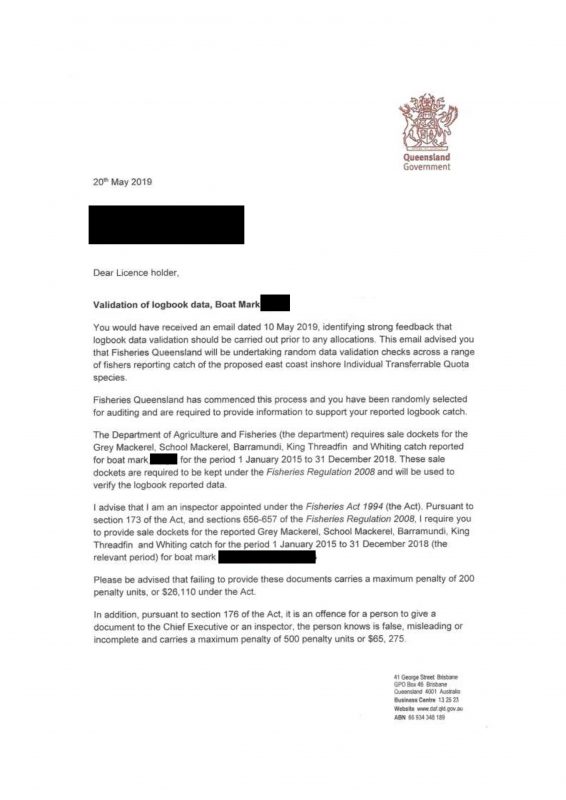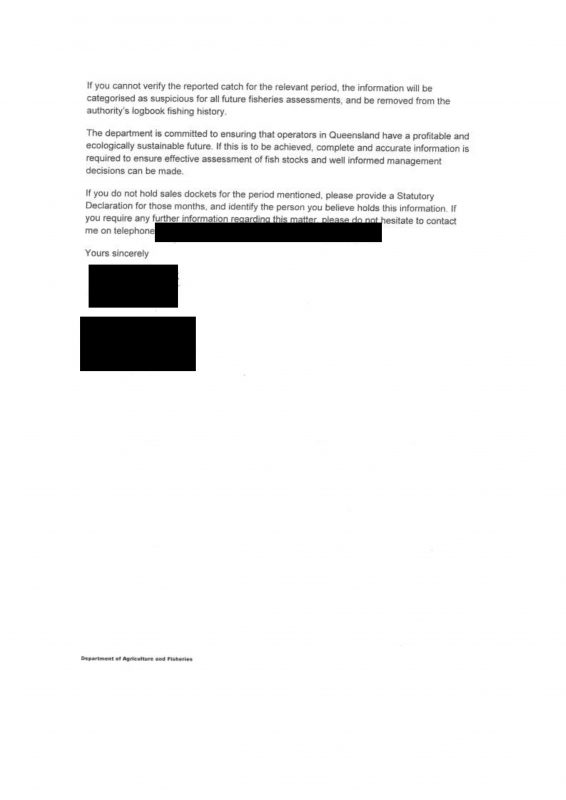Commercial fishers threatened

I have received a number of calls regarding correspondence sent to my members by Fisheries Queensland.
Considering every fisherman who catches certain species is going to be allocated quota under the new fisheries management plan, and that the accusations fly thick and fast from recreational anglers, environmental non-government organisations (eNGOs) and government regarding fishermen lying in their logbooks (which incidentally only ask for estimates in the first place).
One would think that, to be fair and to get a reasonable assessment of how reliable individual fishermen’s logbook data is, every fisherman would be required to provide some validation for his/her catches in random time periods.
Such a process might look like this:
- Commercial Fisher A to provide validation for catch data for Jan 2015 and September 2017.
- While Fisher B provides validation for February 2016 and August 2018.
- Fisher C provides validation for October 2016 and Mar 2018 and so on with all fishers providing data validation according to a couple of time periods chosen at random by Fisheries Queensland..
Sound fair? I think so and so do many others.
Such a process would give the department a sample from every fishers’ validation while also providing them with evidence of the suitable margin of error that should be applied to each fishers’ catch estimates to determine quota allocations and would give a better view of the level of accuracy in the logbook system. This would either prove or dispel once and for all, justification for the accusation against fishers of always lying in their logbooks. However, this does not seem to be the view of Fisheries Queensland.
I have received calls from commercial fishers feeling persecuted and noting that random data validation means that Fisheries Queensland has nominated a small number of fishers and forced them under threat of huge fines to provide all their sales dockets for the entire four-year period from 1 Jan 2015 to 31 Dec 2018.
I have received a copy of the letter that was sent to these selected individuals. Some thoughts on the letter – ‘Intimidation’, ‘Vindictive’ and ‘Insulting’. The letter is cited at the end of this post.
Some key questions have been raised including:
- What was the purpose of the data validation process?
- What were the grounds that gave the department justification for choosing these individuals and requiring them to provide the full four years’ sales dockets to validate their entire catch histories while the majority are not required to validate anything?
- More particularly, why was it necessary to then threaten these particular individual fishers with exorbitant fines for non-compliance with a direction that does not apply to all the other fishers?
- Were there any grounds of suspicion or was it victimisation of the fishers who disagreed with them over the reform – to put them in their place?
It’s important to note that during the process of this fisheries reform, the government actually engaged researchers at taxpayers’ expense. Why, to undertake a study to determine how the department can better engage with fishers since the relationship has been and remains toxic.
Why can’t the department use basic manners and actually win friends and influence people by simply treating commercial fishers as people instead of treating them as criminals.
The process as implemented by Fisheries Queensland will not lift the cloud that hangs over the veracity of logbook data. Fisheries Queensland knows that they, the environmental organisations and recreational anglers will continue to be able to fling the accusations of dishonesty in commercial logbook data and use that as justification for imposing further archaic restrictions on the seafood industry.
The last thing I want to refer to in the letter is that they claim that these particular individuals are required to validate ALL of their catches of the particular species over a four-year period because it is so vitally important to having accurate stock assessments. Meanwhile the reality is that the department is not checking the majority of the other fishers’ catch data and at the same time, not requiring any recreational catch data at all.
This situation is hot on the heels of the department’s happy announcement of the results of the voluntary boat ramp recreational fishing surveys reportedly indicating that each of approximately 6,000 anglers caught slightly more than one fish each per year. What about the remaining 636,000 recreational anglers?
Now, we’ve all seen recreational fishing brag photos whether on TV, in magazines, on social media or in friends’ photo galleries, so we know that such results cannot be anything like a true indicator of actual recreational catch data or effort. The department unashamedly refuses to seek more accurate recreational fishing data, so It is hard to believe that, ‘complete and accurate information’ is actually important to the department, ‘to ensure effective assessment of fish stocks and well-informed management decisions can be made’ as they profess or for any other purpose.
How can, ‘complete and accurate information’ be obtained while treating the two sectors totally differently? While these anomalies exist in the current reform process, no one can take the department’s rhetoric seriously and they have the audacity to threaten a few fishers while ‘requesting’ validation of those fishers’ catches!
What will we see next? Fisheries Queensland needs to step up and wake up. This approach has no place in our State fisheries management.
Industry has been advised that the department is undertaking a ‘Social and Economic value project’. Given how the department engages with my industry, why would commercial fishers participate in the project? The department has had decades to do a project of this kind which should have been done BEFORE embarking on the twenty-plus years of exponentially increased management experiments they have chosen to foist upon industry – so why pick the reform process, to build trust? Good luck with that.
In reality, the reform process wouldn’t be needed if they’d done anything right over the past twenty-plus years so given their track record it’s not really surprising that the reform has turned into just another one in a long line of fisheries management fiascos.
Author: Eric Perez, QSIA CEO
Image: QSIA
The content of this post is provided for information purposes only and unless otherwise stated is not formal QSIA policy. The information on these posts are provided on the basis that all persons accessing the information undertake their own responsibility for assessing the relevance and accuracy of it.



